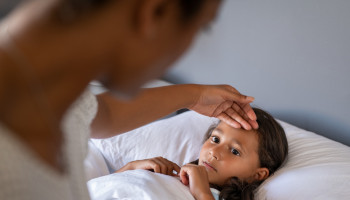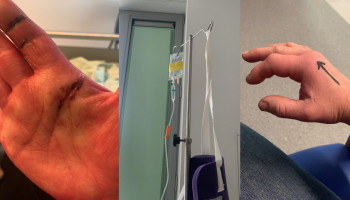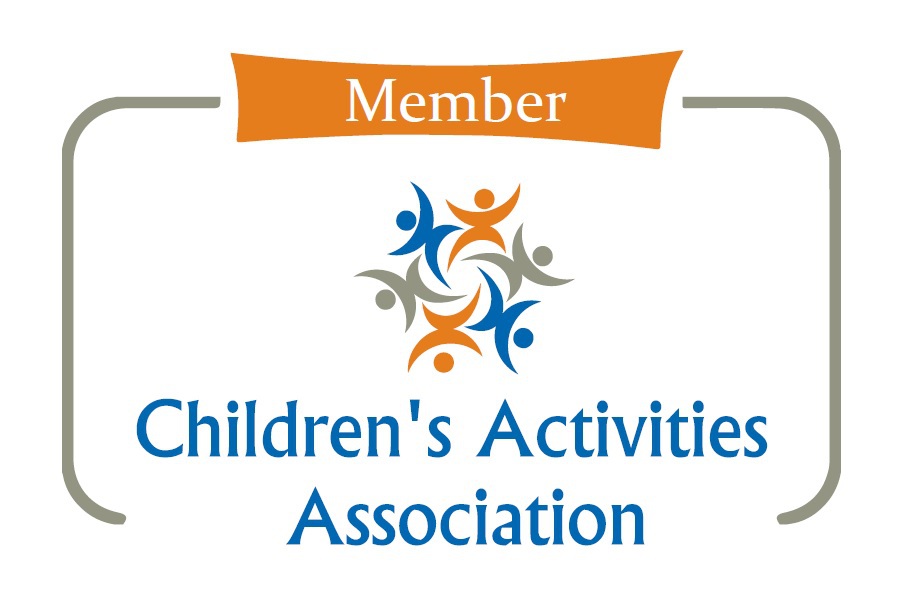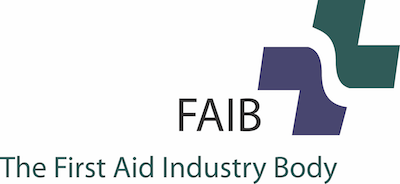World Sepsis Day falls this week on Sunday 13th September. As such we have teamed up with The UK Sepsis Trust who work tirelessly to help avoid preventable deaths from sepsis, and to support those affected by sepsis, whether personally or via their loved ones. Over to the the experts . . .
Many people have never heard of sepsis, or if they have, people are often confused about what it is, and what signs to look out for. However, sepsis kills 48,000 people in the UK every year, which is more than breast, bowel and prostate cancer deaths combined. If it isn’t treated immediately as a medical emergency it can take someone’s life in under 24 hours. Although it can affect anyone of any age, pregnant women, women who have recently given birth, babies and young children are some of those most vulnerable to developing the condition.
Thanks to Mini First Aid, we (The UK Sepsis Trust) are able to share the symptoms to look out for, and what to do if you suspect sepsis, so that you can protect yourself and your children.
We completely understand that pregnancy and parenthood can be really stressful at times, and this blog post is not meant to frighten or give you ‘another thing to worry about’! The idea is to empower you with knowledge about sepsis so that if something doesn’t feel right, you have the confidence to contact your healthcare professional and Just Ask: “Could it be sepsis?”
What is sepsis?
Sepsis - sometimes confused with septicemia or blood poisoning - is the body’s over reaction to an infection or injury, which causes the immune system to attack its own organs and tissues. It affects 245,000 people every year, and 25,000 children are hospitalised with the condition. If not caught quickly enough, sepsis can result in organ failure, amputation and death. However, with early diagnosis it can be treated with intravenous antibiotics and fluids, and the outlook is often good for the vast majority of patients who proactively seek urgent medical attention!
The most crucial thing to understand is that sepsis is triggered by any infection or injury (no matter how minor either may seem). Some of the most common causes of sepsis in both adults and children are from urinary tract infections, infected cuts or bites, a wound from trauma or recent surgery and chest infections.
What do I need to look out for?
There’s no ‘one sign’ and it can be difficult to identify, especially in babies and young children. If you or your child display any of the symptoms - which spell sepsis - listed below or are just really unwell, seek immediate medical advice and Just Ask: “Could it be sepsis?”
Symptoms of sepsis in adults:
· Slurred speech or confusion
· Extreme shivering or muscle pain
· Passing no urine in 24 hours
· Severe breathlessness
· ‘I feel like I might die’*
· Skin that's mottled, very pale or slightly blue
*Many people are surprised to see ‘it feels like I’m going to die’ listed as a symptom, but this is frequently reported amongst people who have suffered from sepsis! Many people who survive say that it was the most unwell they’ve ever felt, and that it feels incredibly frightening.
The most common symptoms in children are:
· Very fast breathing
· A seizure or a ‘fit’
· Skin that's mottled, pale or slightly blue
· Rash that does not fade when you press it
· Very lethargic or difficult to wake
· Abnormally cold to touch
The most common symptoms in children under 5 years-old are as above, and also include:
· Not feeding
· Vomiting repeatedly
· Not passing urine for 12 hours
We have created a free leaflet available to download here: https://sepsistrust.org/wp-content/uploads/2020/08/Paediatric-Leaflet.pdf, for you to reference if your child is ill and you’re concerned about sepsis. It was created in collaboration with world sepsis experts, paediatricians, nurses, GPs and parents of children who suffered from sepsis, and it has a comprehensive list of symptoms to look out for, and what to do.
William Mead

Melissa Mead MBE, our inspiring ambassador tragically lost her 12 month-old son William (pictured above) in 2014 to sepsis, after doctors misdiagnosed a chest infection that developed into pneumonia, triggering sepsis. In her devastating account of William’s story, she writes that “If I’d known what sepsis was, what the symptoms are, then I’d have known what to do”. To read William’s story, please follow this link: https://sepsistrust.org/about/about-sepsis/patient-stories/william/.
Melissa has campaigned tirelessly to raise awareness of sepsis, and last year was awarded an MBE in recognition of her work. Upon receiving her award, she said that she campaigns “to raise awareness of sepsis in the hope that other families can avoid treading the path that we have, since the avoidable death of our son William. The best thank you that I receive is contact from someone to say that because of my work and that of the UK Sepsis Trust, their loved one’s life has been saved.”
Maternal and Postpartum sepsis
Pregnant women and women who have recently given birth are at risk of developing maternal or postpartum sepsis. This can be caused by complications during pregnancy or birth, invasive procedures and infections (which sometimes can be unrelated to pregnancy such as a chest infection). Some of the main causes of sepsis in this group of women are miscarriage, caesarean sections, prolonged or obstructed labour, infection following birth and mastitis.
To summarise, if you notice any of the following symptoms in yourself or a loved one, it’s crucial to seek immediate medical advice by calling 111, 999 or going straight to A&E:
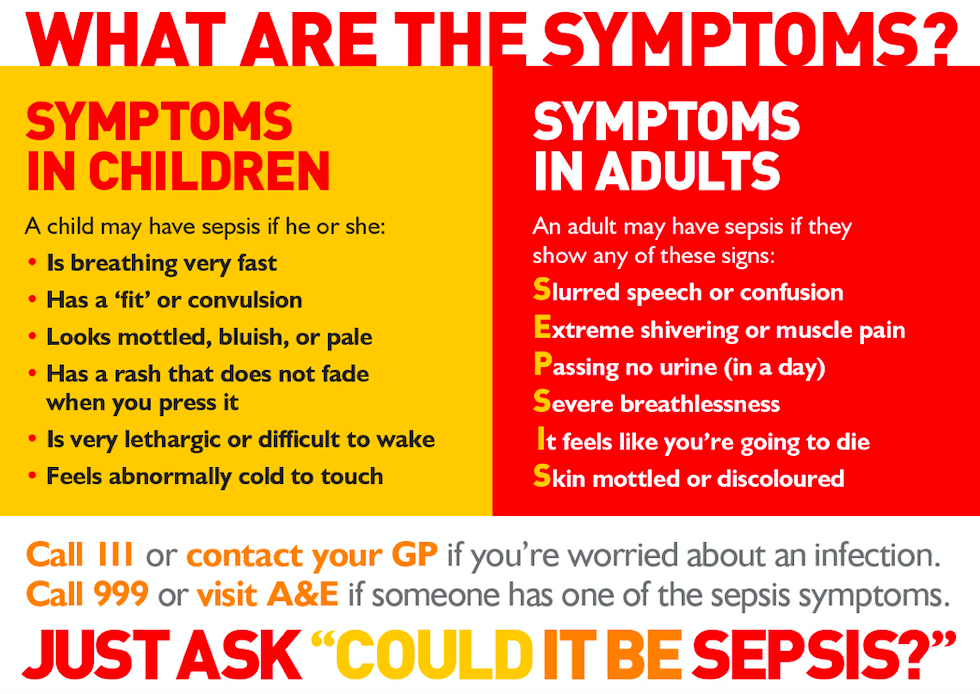
For more information about sepsis please visit https://sepsistrust.org/about/about-sepsis/, and for up to date information about the work of the charity please follow our social media pages!
If you’ve been affected by sepsis, UKST offer a completely free and confidential support service, run by specialist NHS sepsis and ICU nurses with many years’ experience. They’re passionate and dedicated to help those struggling with grief, having problems with recovery or trying to support a loved one. The team operate a support telephone line and email service which is open 24/7, as well as free support groups. Please visit sepsistrust.org/get-support for more information, alternatively, you can contact the support line directly by email via support@sepsistrust.org, or by phone - 0808 800 0029.
A note on antibiotic stewardship: The UK Sepsis Trust state that antibiotics can cause harm if given inappropriately and doctors should always prescribe with caution. In the case of sepsis however, they are the single most important life-saving measure.

